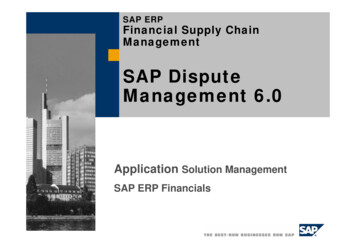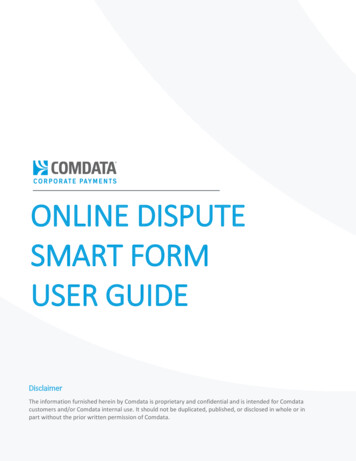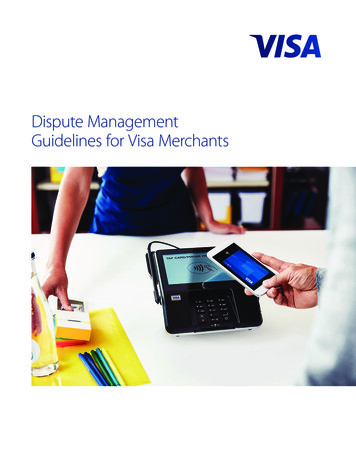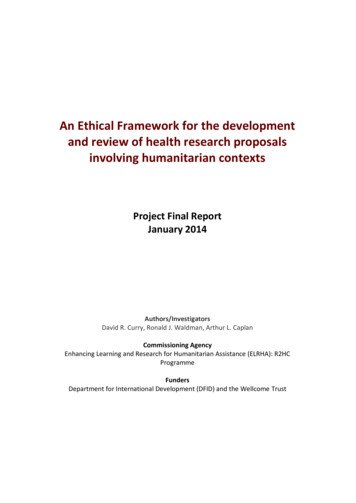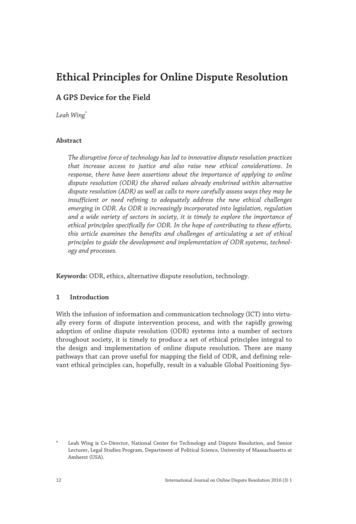
Transcription
Ethical Principles for Online Dispute ResolutionA GPS Device for the FieldLeah Wing*AbstractThe disruptive force of technology has led to innovative dispute resolution practicesthat increase access to justice and also raise new ethical considerations. Inresponse, there have been assertions about the importance of applying to onlinedispute resolution (ODR) the shared values already enshrined within alternativedispute resolution (ADR) as well as calls to more carefully assess ways they may beinsufficient or need refining to adequately address the new ethical challengesemerging in ODR. As ODR is increasingly incorporated into legislation, regulationand a wide variety of sectors in society, it is timely to explore the importance ofethical principles specifically for ODR. In the hope of contributing to these efforts,this article examines the benefits and challenges of articulating a set of ethicalprinciples to guide the development and implementation of ODR systems, technol‐ogy and processes.Keywords: ODR, ethics, alternative dispute resolution, technology.1IntroductionWith the infusion of information and communication technology (ICT) into virtu‐ally every form of dispute intervention process, and with the rapidly growingadoption of online dispute resolution (ODR) systems into a number of sectorsthroughout society, it is timely to produce a set of ethical principles integral tothe design and implementation of online dispute resolution. There are manypathways that can prove useful for mapping the field of ODR, and defining rele‐vant ethical principles can, hopefully, result in a valuable Global Positioning Sys‐*12Leah Wing is Co-Director, National Center for Technology and Dispute Resolution, and SeniorLecturer, Legal Studies Program, Department of Political Science, University of Massachusetts atAmherst (USA).International Journal on Online Dispute Resolution 2016 (3) 1
Ethical Principles for Online Dispute Resolutiontem (GPS)1 device for this journey. The Ethical Principles for Online Dispute Res‐olution (ODR)2 are designed to enhance the quality, effectiveness and scope ofdispute resolution processes that employ technology.3 Taken together, it is hopedthat they can provide a guide for best practices, standards, rules, qualifications,and certification efforts in dispute resolution and related fields that address dis‐pute resolution processes and practices. These Ethical Principles for Online Dis‐pute Resolution4 build on previous work on principles and standards of practiceby the National Center for Technology and Dispute Resolution, as well as thegrowing body of literature and the standards of numerous professional, govern‐mental and commercial bodies concerning ODR and dispute resolution more gen‐erally.Not surprisingly, as online dispute resolution begins its third decade, therehave been increasing calls for attention to the ethical and regulatory dimensions1234The choice of GPS as a metaphor is employed to encourage viewing the ‘ethical principles’ as aguide that (1) reminds us where we are (our shared values) on a map used across multiple juris‐dictions (giving cohesion to the overarching journey); (2) provides guidance for where we want togo (illustrating not only a recommended path but also the distance between where we are andwhere we want to go when developing and implementing ODR processes); (3) reminds us that weare connected to other places and people (whether that be across temporal or geographical dis‐tances – the history and knowledge of ADR and those in other jurisdictions and cultures who arealso stakeholders in ODR, for example); (4) demonstrates that there is more than one route toget where we are going (thus allowing for a variety of interpretations as relevant by culture, legaljurisdiction, sector of society, etc.) and (5) is continually responsive to a changing terrain(whether that be technological innovations, new legislation, discovery of new ethical dilemmasor cultural limitations of the ethical principles) and adjusting to provide the best guidance forour way forward.The ethical principles for online dispute resolution (ODR) presented in this article are: accessibil‐ity, accountability, competence, confidentiality, empowerment, equality, fairness, honesty,impartiality, informed participation, innovation, integration, legal obligation, neutrality, protec‐tion from harm, security and transparency. See also L. Wing, ‘Ethics and ODR: Ethical Principlesfor Online Dispute Resolution’, National Center for Technology and Dispute Resolution, 2016,available at: http://odr.info/ethics-and-odr/ (accessed 23 May 2016).Online Dispute Resolution is framed as inclusive of any process or intervention used to handledisputes that employ information and communication technologies.These principles were designed under the auspices of the National Center for Technology andDispute Resolution (NCTDR), specifically building on the knowledge and expertise of the Fellowsof the NCTDR and the 2009 NCTDR Advisory Board’s statement on ethical principles and stan‐dards for ODR. Special thanks go to Vikki Rogers, Assistant Dean for Online Programs at TheElisabeth Haub School of Law at Pace University, for her feedback on this article.International Journal on Online Dispute Resolution 2016 (3) 113
Leah Wingof ODR.5 When reflecting on the impact of the infusion of technology into theway that disputing is managed, the field is uncovering a plethora of questions andchallenges that directly relate to ethics: some of them newer6 and some versionsof old ones we in the broad alternative dispute resolution (ADR) field have yet5614See Wing, 2016; Advisory Committee, National Center for Technology and Dispute Resolution,Online Dispute Resolution Standards of Practice, 2009, available at: of-practice-en.pdf (accessed 23 May 2016); A. Barsky, ‘The Ethics ofApp-Assisted Family Mediation’, Conflict Resolution Quarterly, Vol. 34, No. 1, Fall 2016, pp.31-42; P. Casanovas & J. Zeleznikow, ‘Online Dispute Resolution and Models of Relational Lawand Justice: A Table of Ethical Principles’, in P. Casanovas et al. (Eds.), AICOL IV/V 2013, LNAI8929, Springer-Verlag, Berlin, Heidelberg, 2014, pp. 54-68; J. de Werra, ‘ADR in Cyberspace: TheNeed to Adopt Global Alternative Dispute Resolution Mechanisms for Addressing the Challengesof Massive Online Micro-Justice’, Swiss Review of International & European Law, forthcoming; N.Ebner & J. Zeleznikow, ‘No Sheriff in Town: Governance for the ODR Field’, Negotiation Journal,Vol. 32, No. 4, 2016, pp. 297-323; The European Parliament and the Council of the EuropeanUnion, ‘Regulation of the European Parliament and of the Council on Online Dispute Resolutionfor Consumer Disputes and Amending (EC) No. 2006/2004 and Directive 2009/22/EC (Regula‐tion on Consumer ODR) ODR Regulation (EU) 524/2013’, Official Journal of the European Union,2013, L 165/63; S. Jani & C. Getz, Mediating from a Distance: Suggested Practice Guidelines for Fam‐ily Mediators (2nd ed.), Mediate BC Society, Vancouver, 2012, available at: s/Guidelines Mediating-from-a-Distance-(Second-editi.aspx (accessed 6 October 2016); K.C. Liyanage, ‘The Regulation of Online Dispute Resolution: Effec‐tiveness of Online Consumer Protection Guidelines’, Deakin Law Review, Vol. 17, No. 2, 2012, pp.251-282; J. DeMars et al., ‘Virtual Virtues: Ethical Considerations for an Online Dispute Resolu‐tion Practice’, Dispute Resolution Magazine, Vol. 17, No. 1, 2010, pp. 6-10; R. Morek, ‘The Regula‐tory Framework for Online Dispute Resolution: A Critical View’, Toledo Law Review, Vol. 38, No.1, 2006, pp. 163-192; D. Rainey, ‘Third-Party Ethics in the Age of the Fourth Party’, InternationalJournal of Online Dispute Resolution, Vol. 1, No. 1, 2014, pp. 37-56; S.J. Shackelford & A.H. Ray‐mond, ‘Building the Virtual Courthouse: Ethical Considerations for Design, Implementation, andRegulation in the World of ODR’, Wisconsin Law Review, Vol. 3, 2014, pp. 614-657; A.H. Ray‐mond & S.J. Shackelford, ‘Technology, Ethics, and Access to Justice: Should an Algorithm BeDeciding Your Case?’, Vol. 35, Spring 2014, pp. 485-524; C. Rule, Online Dispute Resolution forBusiness: B2B, Ecommerce, Consumer, Employment, Insurance, and Other Commercial Conflicts, Jos‐sey-Bass, San Francisco, 2002; M.E. Sole, ‘E-mediation: A New Stage of Ethics’, 2015, available at: www.mediate.com/articles/SoleME4.cfm (accessed 6 October 2016); UNCITRAL, Online Work‐ing Group III: Online Dispute Resolution, 2016, /3Online Dispute Resolution.html (accessed 22 August 2016); N. Welsh, ‘ODR: A Timefor Celebration and the Embrace of Procedural Safeguards’, Conference presentation at the Inter‐national Forum for Online Dispute Resolution, The Hague, May 2016, available at: n-odr (accessed 7 October 2016); and A. Wiener,‘Regulations and Standards for Online Dispute Resolution: A Primer for Policymakers and Stake‐holders’, 2001, available at: www.mediate.com/articles/awiener2.cfm (accessed 22 August2016).For a discussion of the ethical role of algorithms in dispute prevention, management and resolu‐tion, see de Werra, forthcoming and Morek, 2006. Exploration of some of the ethical challengesfor ensuring confidentiality, privacy and security with the use of technology are examined byBarsky, Fall 2016 and UNCITRAL, 2016.International Journal on Online Dispute Resolution 2016 (3) 1
Ethical Principles for Online Dispute Resolutionto address successfully7 – ones that technology also has the capability to assistwith.8 In this way, by exploring ethical issues regarding technology and disputeresolution, we are also uncovering opportunities to better serve stakeholders andenhance trust in the quality of what the field can deliver. If we hope to have asethical a set of tools and processes as we can, it is incumbent upon us to explorethe ethics of technology-assisted management of data and communication as partof dispute handling processes.9 And it would behoove us to consider them acrossa range of professions and sectors of society, not only in the arena of traditionalADR fora, given that ODR is being harnessed in a wider variety of settings thanever before. For example, ethical concerns arise with managing complaints overreputational reviews for e-commerce and concerns regarding electronic healthrecords, in designing dispute management systems for businesses and govern‐ment agencies, as well as when employing email, electronic calendars, brain‐storming software and video conferencing for arbitration and mediation.The infusion of technology in all facets of our lives – work, commerce, poli‐tics, education, relationships and leisure – has resulted in its ubiquitous use aspart of managing conflict in each of them, as well. This has propelled discussionsin the field as to how it has changed dispute resolution practices and raises789These include whether and how a conflict intervenor should attempt to address power imbalan‐ces (see D. Kolb et al., When Talk Works: Profiles of Mediators, Jossey-Bass Publishers, San Fran‐cisco, 1994; and L. Susskind & J. Cruikshank, Breaking the Impasse: Consensual Approaches toResolving Public Disputes, Basic Books, New York, 1987); whether and how to account for culturaldifferences between disputing parties (see R. Cohen, Negotiating Across Cultures, U.S. Institute ofPeace Press, Washington, 1991, and M.A. Trujillo et al. (Eds.), Re-Centering Culture and Knowledgein Conflict Resolution Practice, Syracuse University Press, Syracuse, 2008); how institutionaliza‐tion of dispute resolution into existing systems such as court and schools increases access to jus‐tice or undermines it and for which groups (see R. Delgado et al., ‘Fairness and Formality: Mini‐mizing the Risk of Prejudice in Alternative Dispute Resolution’, Wisconsin Law Review, 1985, pp.1359-1404; T.S. Jones & D. Kmitta (Eds.), Does It Work? The Case for Conflict Resolution Educationin our Nation’s Schools, CREnet, Washington, 2000; and N.A. Welsh, ‘The Thinning Vision of SelfDetermination in Court-Connected Mediation: The Inevitable Price of Institutionalization?’,Harvard Negotiation Law Review, Vol. 6, 2001, pp. 1-96).For a discussion of some of the ways that technology may be able to assist with ongoing dilem‐mas in ADR such as power imbalances, see Barsky, Fall 2016; de Werra, forthcoming; Morek,2006; and Rainey, 2014.See the following for further discussion on this topic: Barsky, Fall 2016; Rainey, 2014; DeMars etal., 2010; C. Menkel-Meadow, ‘Are There Systemic Ethics Issues in Dispute System Design? andWhat We Should [Not] Do About It: Lessons from International and Domestic Fronts’, HarvardNegotiation Law Review, Vol. 14, Winter 2009, pp. 195-231; Casanovas & Zeleznikow, 2014. Andfor a discussion on the relationship between ODR and computational and informational ethics,see P. Casanovas et al. (Eds.): AICOL IV/V 2013, LNAI 8929, Springer-Verlag, Berlin, Heidelberg,2014, pp. 54-68; R. Devanesan & J. Aresty, ‘ODR and Justice – An Evaluation of Online DisputeResolution’s Interplay with Traditional Theories of Justice’, in M.S. Abdel Wahab, E. Katsh, & D.Rainey (Eds.), Online Dispute Resolution: Theory and Practice, A Treatise On Technology and DisputeResolution, Eleven International Publishing, The Hague, 2012, pp. 251-293; and Morek, 2006.International Journal on Online Dispute Resolution 2016 (3) 115
Leah Wingimportant ethical considerations.10 In response, there has been growing interestboth in continuing these conversations and in taking action to address the impli‐cations of technology’s impact. And within these discussions, there is a frequentassertion of the importance of applying a common set of shared values alreadyenshrined within the field of ADR in the form of standards, best practices, normsand principles.11 These efforts have helped to create a momentum for additionalcontemplation and action to address the consequences of the application of tech‐nology to dispute resolution. To further these efforts, this article explores thebenefits and challenges of articulating broadly shared values within a frameworkof ethical principles12 that is specifically designed to guide the ethical develop‐ment and implementation of ODR systems, technology and activities.2Motivation and Inspiration for ODR Ethical PrinciplesDiscussions in the literature offer valuable insights into these important ques‐tions, and this article seeks to contribute to that conversation. As others havealso argued, there are a number of reasons why timing is right for furtheraddressing the call, and they include key arguments that (1) public articulation ofprinciples and standards can contribute to increasing trust for the use of ODR;13(2) if the ODR field does not effectively accomplish this, then others external to itwill do so, or, even worse, they will construct regulations for ODR that do notreflect the shared values of our field;14 (3) those constructing and using ODR plat‐forms and processes are already routinely facing ethical dilemmas15 in whichthose with less access and power are particularly vulnerable;16 and (4) there isalready a wealth of expertise among ODR intervenors, scholars and those runningorganizations and agencies that offer ODR services,17 which includes a fairly con‐sistently articulated set of shared values that provide a strong foundation fromwhich to work. Therefore, with a growing refrain within the field of ODR, theneed to provide ethical, high-quality ODR services, and, importantly, with others101112131415161716See, for example, Advisory Committee, National Center for Technology and Dispute Resolution,2009; Ebner & Zeleznikow, 2016; Internet Corporation for Assigned Names and Numbers(ICANN), ICANN Ombudsman ODR Standards of Practice, available at: ctice-2012-02-25-en (accessed 22 August 2016); DeMars et al., 2010;Morek, 2006; Rainey, 2014; Shackelford & Raymond, 2014; Raymond & Shackelford, Spring2014; Rule, 2002; Wing, 2016; and work by the Ethics Working Group of the International Medi‐ation Institute, https://imimediation.org/ (accessed 5 October 2016).Id.This article does not undertake to address the question of regulation; rather, it examines thebenefits of articulating non-rules-based shared principles upon which field governance, regula‐tion and other modes of accountability could be further constructed.See Ebner & Zeleznikow, 2016; Liyanage, 2012; and Morek, 2006.See Ebner & Zeleznikow, 2016.See Barsky, Fall 2016.See de Werra, forthcoming; Morek, 2006; and Welsh, May 2016.Arguably, the vast literature and experience in the field of ADR has a wealth of scholarship,expertise and standards that require careful consideration for determining what to apply whole‐sale or alter to be relevant to ODR. For a related discussion, see Rainey, 2014.International Journal on Online Dispute Resolution 2016 (3) 1
Ethical Principles for Online Dispute Resolutionexternal to our field already creating legislation and administrative regulationsfor ODR,18 we would do well to amplify our attention to ethics and ODR, and con‐sider ways of broadcasting how we are integrating them within our own practicesas well as within the other systems into which ODR is becoming imbedded.Towards that end, a set of ethical principles is presented here as part of the effortto contribute to outlining and supporting effective ethical practices of the field.Whereas a more robust and broad-ranging discussion about standards could alsobe welcome at this time, the ethical principles presented here are not offered asstandards or codes of conduct but rather as an articulation of shared values. Assuch, they will hopefully contribute to forming a basis for further work on othermechanisms to govern the field.In undertaking this work, we face “the tension of universality or generality”,19a central dilemma for the enterprise of creating ethical principles in an area wherethere are a multitude of dispute resolution fora, types of entities involved, inter‐secting fields and stakeholders. These ethical principles need to be generalenough to be applicable in different settings, cultures and jurisdictions, while alsoreflecting an overarching cohesion and offering durability over time.20 Unavoida‐ble tensions must be considered as we contemplate articulating a broad set of eth‐ical principles for the field and also examine the ramifications of not doing so.This challenge cannot be underestimated – calls for universally shared valueshave often been utilized to frame the values of the centre to be imposed on theperiphery and ignore the realities of cultural differences and the impact of powerimbalances. How can we effectively seek to avoid replicating these patterns andensure a sustainable transnational project that is meaningful and not exclusion‐ary? While this project has been built upon the thoughtful work of scholars andpractitioners, representatives of government, business and consumers, as well asmany other stakeholders from around the world, it requires vigilance in continu‐ing to ask this question and have it inform our ongoing efforts. Simultaneously,how do we undertake this endeavour in a timely and effective fashion, given that181920See Wiener, 2001; The European Parliament and the Council of the European Union, ‘Directive2013/11/EU of the European Parliament and of the Council of 21 May 2013 on Alternative Dis‐pute Resolution for Consumer Disputes and Amending Regulation (EC) No 2006/2004 andDirective 2009/22/EC (Directive on Consumer ADR)’, Official Journal of the European Union,2013, L 165/1-12; The European Parliament and the Council of the European Union, 2013; andUNCITRAL, 2016.See a discussion of this tension regarding the creation of ethical principles to be used as stan‐dards of accountability for ADR dispute system design in Menkel-Meadow, Winter 2009, p. 212.For exploration of challenges on the related topic of regulating dispute resolution systems andpractices across multiple fields, sectors of society and across jurisdictions, see Menkel-Meadow,Winter 2009; C. Menkel-Meadow, ‘Ethics Issues in Arbitration and Related Dispute ResolutionProcesses: What’s Happening and What’s Not’, 56 U. Miami L. Rev. 949, 2002; Ebner & Zelezni‐kow, 2016. For a related discussion, see K. Bagshaw, ‘Principles v Rules’, accountancymaga‐zine.com December 2006, p. xxx, available at: hics/principles-vs-rules.ashx?la en (accessed 30 September 2016). For a discussionabout the challenges of developing and regulating ethics across legal jurisdictions and within themultidisciplinary field of ADR, see C. Menkle-Meadow, ‘Ethics in ADR: The Many “Cs” of Profes‐sional Responsibility and Dispute Resolution’, Fordham Urban Law Journal, Vol. 28, 2001, pp.979-990.International Journal on Online Dispute Resolution 2016 (3) 117
Leah Wingthere are already ODR platforms and related laws and regulations governing theiruse at various levels of consideration or implementation,21 along with demandsfor ODR-related standards and rules with a number of efforts underway to createand enforce them?22 Therefore, despite the daunting nature of the endeavour, letus first consider what may be lost if the field does not attempt to craft and func‐tion according to some explicitly stated, shared ethical principles. For example,Shackelford and Raymond23 and Welsh24 remind us of the abuse that has and canoccur in ODR and ADR, respectively, when there is a lack of enforcement of pro‐cedural justice in a field that does not have safeguards to prevent privilegingrepeat players, among others.25 And Ebner and Zeleznikow26 encourage us, asnoted above, to be aware that, if we do not create clear norms and mechanismsfor governing ODR, others external to the field will continue to do so, given theirinvestments in the outcomes it can generate. And they remind us of the overlap‐ping nature of ODR with other public and private systems that have their own2126See, for example, the Government of Canada’s integration of ODR into its justice system: Gov‐ernment of Canada, Department of Justice, Dispute Resolution Reference Guide, Online DisputeResolution, drrg-mrrc/10.html (accessed 2October 2016), particularly the small claims ( www.smallclaimsbc.ca/how-it-works ) and con‐sumer protection processes handled online ( www.consumerprotectionbc.ca/odr ). See also thedirective and regulation by the European Parliament and the Council of the European Union onODR: European Parliament and the Council of the European Union, ‘Directive on ConsumerADR’, 2013; the European Parliament and the Council of the European Union, ‘Regulation onConsumer Disputes’, 2013. In addition, see Lord Justice Briggs, Civil Courts Structure Review:Final Report. Judiciary of England and Wales, July 2016 and Justice, Delivering Justice in an Age ofDisparity: A Report by Justice, 2015.Consider the recent discussion by ICANN, S. Bachollet, ‘CCWG—Accountability Work Stream 2:ICANN Ombuds, Meeting #3, 22 August 2016’, ICANN, available at: www.icann.org/search/#!/?searchText ombuds (accessed 22 August 2016); the multiyear effort by the United NationsCommission on International Trade Law, Working Group III (Online Dispute Resolution),‘Online Dispute Resolution for Cross-Border Electronic Commerce Transactions: Technical Noteson Online Dispute Resolution, Note by the Secretariat’, V.16-02129 , A/CN.9/888, 11 April2016, to create ODR rules; the ongoing work by the International Mediation Institute (IMI) https://imimediation.org/ (accessed 26 October 2016); suggestions outlined in Rule, 2002; thecall for ODR standards in Rainey, 2014; the role of regulation outlined by Morek, 2006, andLiyanage, 2012; as well as groups that have already crafted, endorsed, considered or urged thedevelopment of ODR-related standards and rules: the National Center for Technology and Dis‐pute Resolution (NCTDR), Committee on Legal Affairs and Human Rights of the ParliamentaryAssembly of the Council of Europe, the European Parliament and the Council of the EuropeanUnion, the Internet Corporation for Assigned Names and Numbers (ICANN) and “the US FederalTrade Commission, The Canadian Working Group on Electronic Commerce and Consumers, TheAustralian National Alternative Dispute Resolution Advisory Council, The Alliance for GlobalBusiness, The Global Business Dialogue on Electronic Commerce, The Transatlantic ConsumerDialogue, Consumers International, The European Consumers’ Organisation, The InternationalChamber of Commerce, and The American Bar Association” (Advisory Committee, National Cen‐ter for Technology and Dispute Resolution, 2009, p. 1). For a list of a number of related initia‐tives regarding ODR within the ADR field, see also Wiener, 2001.Shackelford & Raymond, 2014.Welsh, May 2016.For suggestions to the ODR field to prevent and ameliorate such conditions, see Welsh, May2016.Ebner & Zeleznikow, 2016.18International Journal on Online Dispute Resolution 2016 (3) 122232425
Ethical Principles for Online Dispute Resolutionregulation mandates that may not always function in concert with the goals andvalues of ODR.In taking heed of the concern about access to justice, we can see that thereare multiple forces that can perpetuate or ignore barriers to it within ADR andODR, whether or not these efforts are intentional in this regard. For example,consider the fact that private businesses are utilizing and, increasingly, govern‐ments are mandating the use of ODR processes in which the most vulnerable andmarginalized can either have these positionalities reinforced or altered positivelyby the way that an ODR system is structured and implemented.27 And yet therelated concerns that have been raised over the past 40 years regarding ADR haveyet to be effectively addressed within ADR and ODR systems. Challenges remainabout how ADR can inadvertently facilitate or, at least, not attend to the realitiesof power imbalances and marginalization;28 how it “de-contextualizes, de-histori‐cizes, as well as individuates conflicts (Auerbach, 1983; Chene, 2008; Grillo, 1991;Gunning, 1995), thereby creating a homogenized discourse while colluding toreinforce patterns of social inequalities (Abel, 1982; Auerbach, 1983; Delgado,1997; Delgado, Dunn, Brown, Lee, & Hubbert, 1985; Fiss, 1984; and Harrington,1985)”;29 and how the lack of public oversight in privatized cases results in spacesin which third-party biases can more easily flourish.30 These issues of inequalityhave not been fully or adequately addressed by face-to-face ADR; and, while theyalso remain unaddressed in ODR, attempts to do so come up against the addi‐tional challenge that “participants in the field are dispersed geographically andare operating in different systems and jurisdictions – causing any organization oroverall oversight to be more challenging”31 in ODR.It seems incumbent on the ODR field to demand of ourselves that we attemptto address these long-standing critiques that continue to have real-world conse‐quences. The creation of a set of ethical principles could serve as a mechanismthat directs attention to concerns about access to justice, power imbalances, cul‐2728293031For a positive example describing how ODR could increase access to justice for marginalizedimmigrant populations in Canada, see S. Parker-Toulson, Online Dispute Resolution (ODR) andNew Immigrants, British Columbia, Ministry of Labour, Citizens’ Services and Open Government,2010.See the following for further discussion on power imbalances in ADR, particularly with regard torepeat players and access to resources: Consumer Financial Protection Bureau, Arbitration Study:Report to Congress, pursuant to Dodd-Frank Wall Street Reform and Consumer Protection Act1028(a), March 2015; Consumer Financial Protection Bureau, CFPB Considers Proposal to BanArbitration Clauses that Allow Companies to Avoid Accountability to Their Customers, ies-to-avoid-accountability-to-their-customers/ (accessed 6 June 2016); Welsh, May2016; S.A. Talesh, ‘Forward: Why Marc Galanter’s “Haves” Article Is One of the Most InfluentialPieces of Legal Scholarship Ever Written’, in M. Galanter (Ed.), Why the Haves Come Out Ahead:The Classic Essay and New Observations, Quid Pro Books, New Orleans 2014, pp. iii-xii; and Shack‐elford & Raymond, 2014.L. Wing, ‘Intersectionality and Conflict Resolution Pedagogy’, in S. Pliner & C. Banks (Eds.),Teaching, Learning, and Intersecting Identities in Higher Education, Peter Lang Publishers, NewYork, 2012, p. 49.Delgado et al., 1985.See Ebner & Zeleznikow, 2016.International Journal on Online Dispute Resolution 2016 (3) 119
Leah Wingtural differences, marginalization and inclusion in the decision making that takesplace during ODR systems design and implementation. Therefore, it is worthenvisioning how we might use the insights into ADR’s shortcomings – despite itstremendous accomplishments as well – and also carefully consider how we mightseek not to replicate them as we endeavour to prevent, manage and resolve theexplosion of disputes online. The mere effort of searching for common ground increating ethical principles for ODR has great value, although, arguably, it is insuf‐ficient in the face of the need for more ethically responsive dispute resolutionpractices, particularly regarding power imbalances and access to justice. It isimperative, then, that ethical principles designed for ODR are included in thethinking behind the development of ODR systems design and practices, stan‐dards and legislation.The ethical principles outlined in this article are part of the ongoing attemptsto contri
of the NCTDR and the 2009 NCTDR Advisory Board's statement on ethical principles and stan‐ dards for ODR. Special thanks go to Vikki Rogers, Assistant Dean for Online Programs at The Elisabeth Haub School of Law at Pace University, for her feedback on this article. International Journal on Online Dispute Resolution 2016 (3) 1 13
